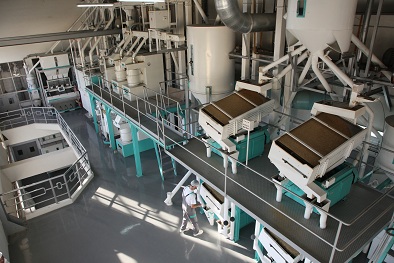Financing the development of rice-based products with the EU's Risk Sharing Instrument

date: 28/05/2014
Project: Ernesto Morgado: Financing the developme...
Contact: http://www.emorgado.pt/
In order to finance this, it secured a EUR 500 000 working capital loan guaranteed through the EU’s Risk Sharing Instrument (RSI).
Transformation
Despite being well-established, the company has completely transformed itself in the last decade. A new state-of-the-art automated milling plant was constructed on the site of the old one. In addition, the company’s organisational structure was developed, with new departments being created, highly skilled people recruited, and a demanding training programme introduced. New production processes were designed and implemented to enable them to produce new products, and partnerships with national and foreign universities were established for the company to gain knowledge in specific areas.
‘We did a SWOT analysis in 2004/2005 that identified several threats and opportunities regarding the rice market,’ explains Ernesto Morgado, the company’s CEO. ‘To survive and to be competitive in a changing market we knew that we would need to improve our operational efficiency, meet new challenges regarding food safety and quality, and find ways to differentiate and improve the added value of our products. This was only possible by investing in high technology, lean processes, excellent people and important partnerships.’
The re-orientation of the company had the desired effect. At the market level, it was able to diversify its product lines, introducing new varieties of rice (basmati, Thai, jasmine, risotto) and rice-based ready-made meals (Pato Real Minuto) that were well received by consumers.
‘In a country with a strong traditional cuisine in rice such as Portugal, successful innovation means developing convenient, high-quality rice-based products with a Portuguese taste at competitive prices,’ Mr Morgado explains. ‘We invested heavily in R&D in advanced food science and technology in order to develop convenient products for people that want a good Portuguese meal but that don’t have the time (or the ability) to prepare it from scratch.‘
They identified the potential of locally produced Japonica rice as a means to achieve this. Japonica rice is used in traditional Portuguese rice dishes because it absorbs the flavour of the ingredients it is cooked with. However, because it is also very sensitive to cooking and re-heating, many modern consumers prefer more resistant types of rice.
‘We wanted to use local Japonica rice to create a competitive advantage over multinational companies with undifferentiated products. If we could offer ready-made meals based on Japonica rice, consumers could enjoy the flavour of traditional dishes and maximum convenience.’
This they managed to achieve, and without using artificial chemical additives, through their R&D projects.
Financing the transformation
Although this re-orientation of Ernesto Morgado has led to expansion, it also commits the company to greater investment in R&D. Moreover, they face a long period between making the R&D investments and receiving the returns through the sales of the developed products. They are therefore dependent on loans, and loans have become much harder to obtain in Portugal in recent years.
‘The economical adjustment programme that has been executed in our country since 2011 represented new financial challenges to Portuguese SMEs,’ Mr Morgado explains. ‘Suddenly there was less money available in the banking sector and the cost to get it increased rapidly.’
The company nevertheless managed to secure a EUR 500,000 working capital loan from the BPI bank in Portugal using a 50% European Investment Fund (EIF) guarantee under the RSI. The RSI guarantee complements the national research promotion schemes in Portugal.
The money will help to finance new product lines, Mr Morgado says: ‘For a long time, we have wanted to develop rice-based desserts and approach new markets like food services and catering with ready-made rice. Our R&D department is working on both and this money was important to allow it.’
Mr Morgado believes that the RSI scheme plays a crucial role for SMEs: ‘We think that it is very important, particularly to companies like ours that have long timeframes between buying the raw materials and receiving payments from the customer. So, food companies that depend on crop cycles will benefit a lot from this scheme.’
